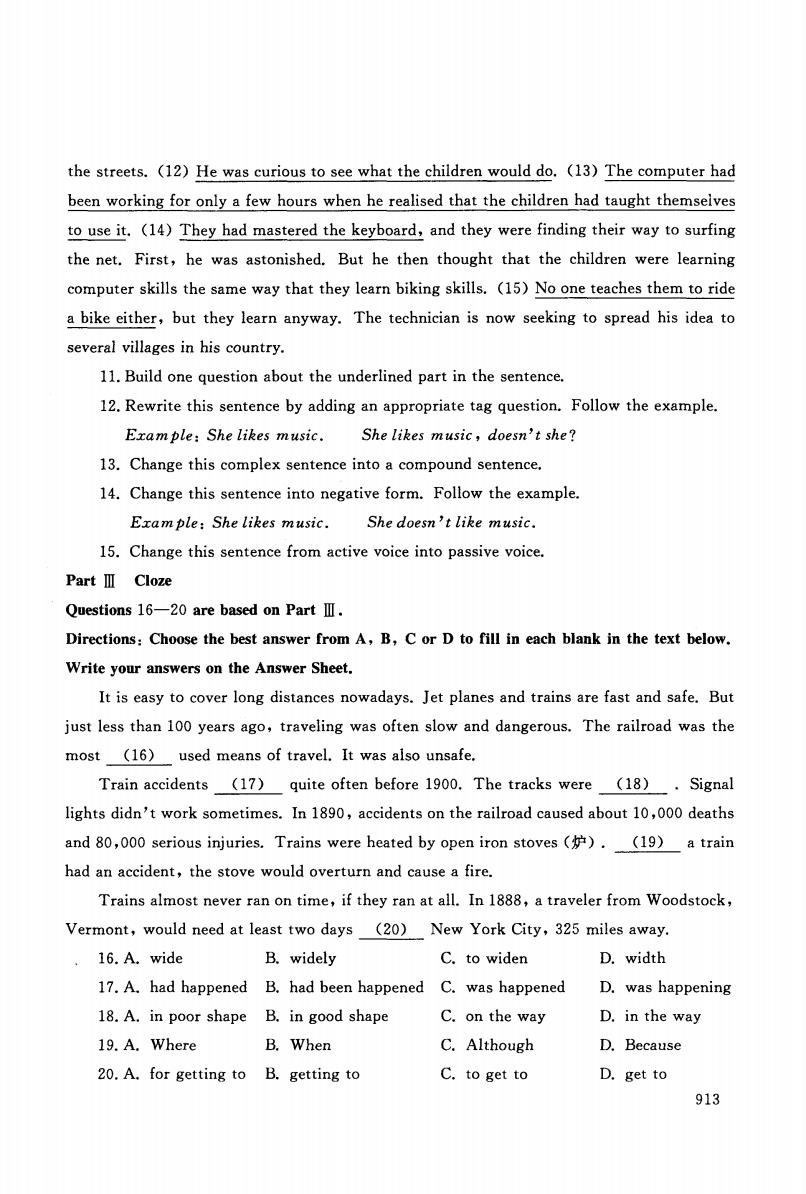正在加载图片...

the streets.(12)He was curious to see what the children would do.(13)The computer had been working for only a few hours when he realised that the children had taught themseives to use it.(14)They had mastered the keyboard,and they were finding their way to surfing the net.First,he was astonished.But he then thought that the children were learning computer skills the same way that they learn biking skills.(15)No one teaches them to ride a bike either,but they learn anyway.The technician is now seeking to spread his idea to several villages in his country. 11.Build one question about the underlined part in the sentence. 12.Rewrite this sentence by adding an appropriate tag question.Follow the example. Example:She likes music.She likes music,doesn't she? 13.Change this complex sentence into a compound sentence. 14.Change this sentence into negative form.Follow the example. Example:She likes music.She doesn't like music. 15.Change this sentence from active voice into passive voice. PartⅢCloze Questions 16-20 are based on Part II. Directions:Choose the best answer from A,B,C or D to fill in each blank in the text below. Write your answers on the Answer Sheet. It is easy to cover long distances nowadays.Jet planes and trains are fast and safe.But just less than 100 years ago,traveling was often slow and dangerous.The railroad was the most (16)used means of travel.It was also unsafe. Train accidents (17)quite often before 1900.The tracks were (18).Signal lights didn't work sometimes.In 1890,accidents on the railroad caused about 10,000 deaths and 80,000 serious injuries.Trains were heated by open iron stoves ()(19)a train had an accident,the stove would overturn and cause a fire. Trains almost never ran on time,if they ran at all.In 1888,a traveler from Woodstock, Vermont,would need at least two days (20)New York City,325 miles away. 16.A.wide B.widely C.to widen D.width 17.A.had happened B.had been happened C.was happened D.was happening 18.A.in poor shape B.in good shape C.on the way D.in the way 19.A.Where B.When C.Although D.Because 20.A.for getting to B.getting to C.to get to D.get to 913the streets. (1 2) H e was curious to see what the children would do. (1 3) T he p u had been working for only a few hours when he realised that the children had taught themselves to use it. (1 4) T hey had mastered the keyboard ,and they were finding their way to surfing the net. First , he was astonished. But he then thought that the children were learning computer skills the same way that they learn biking skills. (1 5) No one teaches them to ride a bike either, but they learn anyway. The technician is now seeking to spread his idea to several villages in his country. 11.Build one question about the underlined part in the sentence. 12. Rewrite this sentence by adding an appropriate tag question. Follow the example. Example: She likes music. She likes music , doesn't she? 13. Change this complex sentence into a compound sentence. 14. Change this sentence into negative form. Follow the example. ExamρIe: She likes music. She doesn 't like music. 15. Change this sentence from active voice into passive voice. Part ill Cloze Qu四tions 16-20 are based on Part ill. Directions : Choose the best answer from A , B, C or D to fill in each blank in the text below. Write yo町answers on the Answer Sheet. It is easy to cover long distances nowadays. Jet planes and trains are fast and safe. But just less than 100 years ago , traveling was often slow and dangerous. The railroad was the most (1 6) used means of travel. It was also unsafe. Train accidents (7) quite often before 1900. The tracks were (8) . Signal lights didn' t work sometimes. In 1890 , accidents on the railroad caused about 10 ,000 deaths and 80 ,000 serious inj uries. Trains were heated by open iron stoves (炉) . (9) a train had an accident , the stove would overturn and cause a fire. Trains almost never ran on time , if they ran at all. In 1888 , a traveler from Woodstock , Vermont , would need at least two days (20) New York City , 325 miles away. 16. A. wide B. widely C. to widen D. width 17. A. had happened B. had been happened C. was happened D. was happening 18. A. in poor shape B. in good shape C. on the way D. in the way 19. A. Where B. 明Then C. Although D. Because 20. A. for getting to B. getting to C. to get to D. get to 913